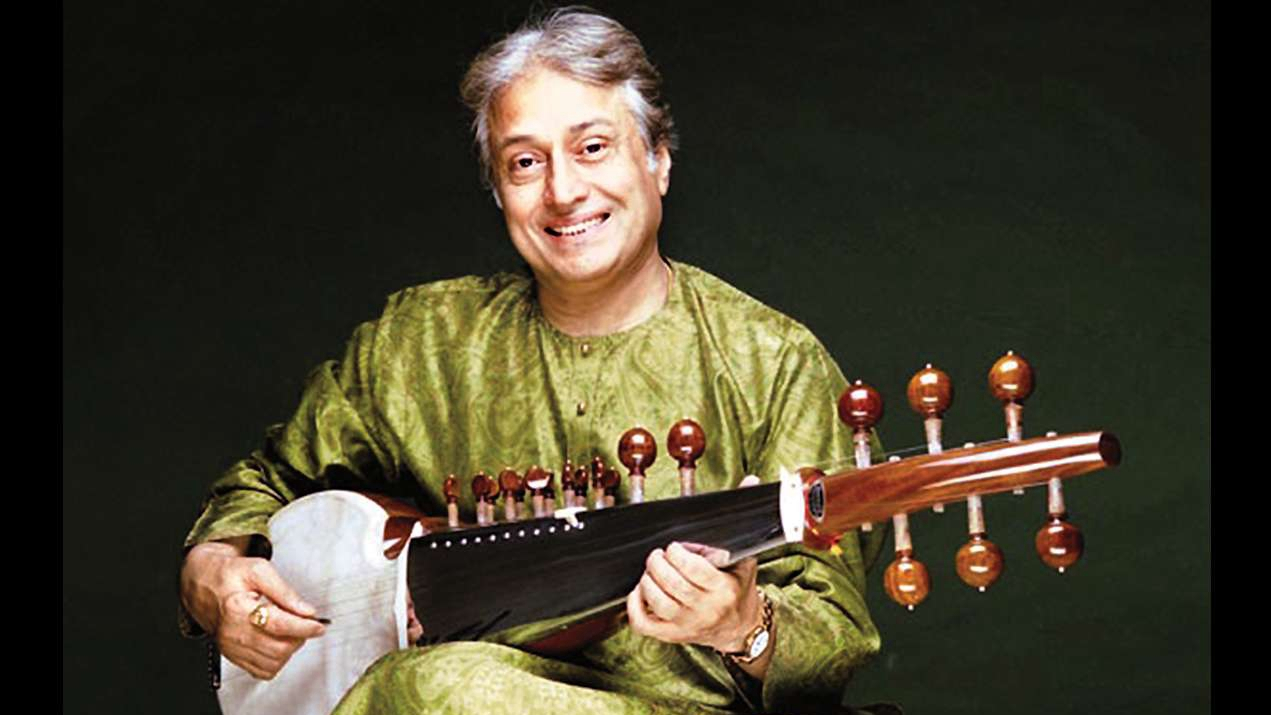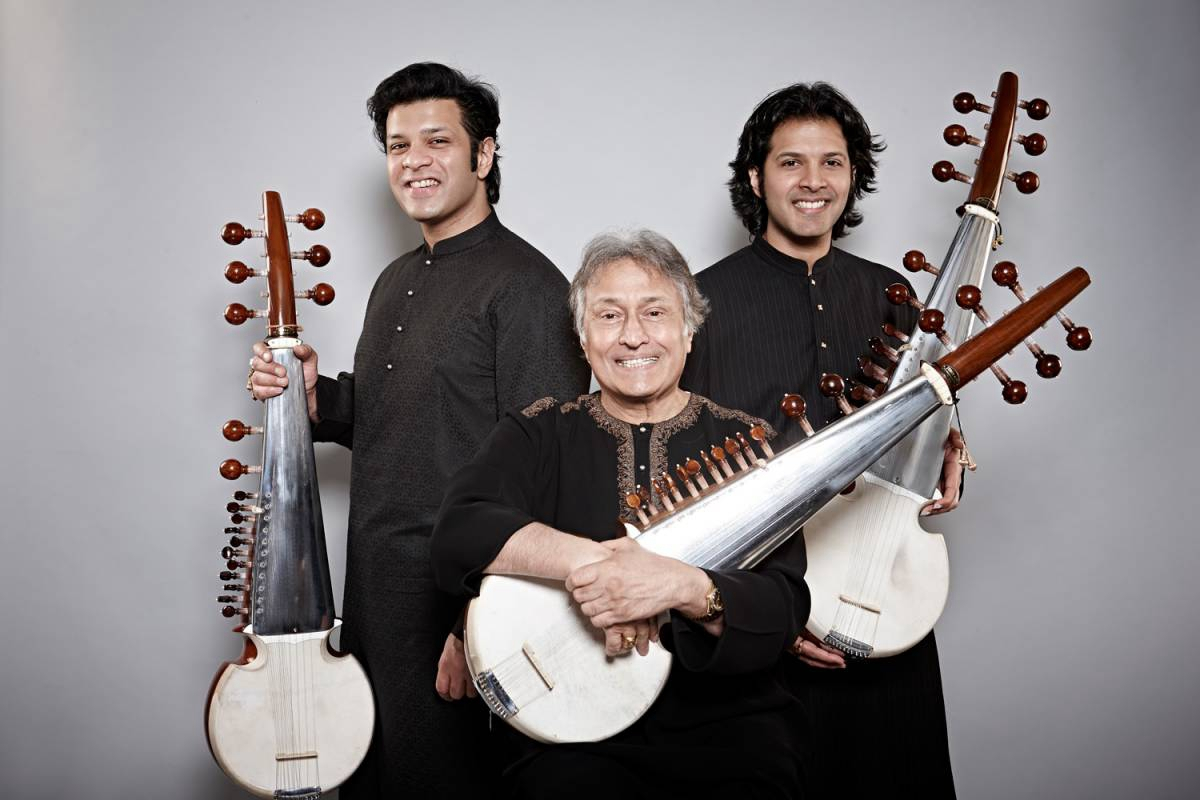
Music
12:10, 31-May-2019
Indian music maestro Ustad Amjad Ali Khan set for China sojourn
By Suvam Pal

He has been arguably the most respected and recognizable face of Indian classical music in the arena of global music for a long time. Ustad Amjad Ali Khan is an institution in his own right and has played a stellar role in building a bridge between Indian classical music and its global counterparts for the past few decades. An exponent of the Indian classical musical instrument of Sarod, which is believed to be a modification of the Rabab, the ancient folk instrument of Iran, Khan is all set to enthrall the music aficionados in China.
The maestro, along with his sons, Amaan Ali Bangash and Ayaan Ali Bangash, will have a two-city China tour, starting on June 15 in Shanghai, and will have another concert in the south Chinese city of Guangzhou on June 18.
In an exclusive interview with CGTN, Khan said, "It's indeed a great honor for us to present our concert in Shanghai and Guangzhou for the music lovers of China. I really look forward to our China performances."
Although he has never performed in the Chinese mainland before, Khan had earlier played with the Hong Kong Philharmonic Orchestra and performed "Raga for Peace" in 2014 Nobel Peace Prize Concert.
"Musicians and listeners of music have been communicating with each other across all barriers through this 'language' from time immemorial. As we use flowers in worship, welcoming, honoring, departure and celebration no matter what our race, origin, religion or language, we similarly arrange musical notes into 'bouquets' or compositions which display all our human feelings and emotions," the 73-year-old legend told CGTN while explaining the power of music.
Coming close on the heels of another legend from his country, Sitar exponent Pandit Ravi Shankar and Sarod legend Ustad Ali Akbar Khan, a charismatic Khan, has been a familiar and well-respected name in the West since performing for the first time in the U.S. as a teenager way back in 1963. His soulful performances and melodious tunes on his string instrument have been mesmerizing the global music lovers for a long time.

Ustad Amjad Ali Khan (C) with his sons Amaan Ali Bangash (L) and Ayaan Ali Bangash (R). /Picture Courtesy: Chaiti Arts Foundation
Ustad Amjad Ali Khan (C) with his sons Amaan Ali Bangash (L) and Ayaan Ali Bangash (R). /Picture Courtesy: Chaiti Arts Foundation
"I cannot remember a particular day that I was initiated into the world of music. It was part of me from as early as I can remember. Indeed, I cannot think of a moment when music has been separated from my life. My father, the legendary Sarod maestro, Haafiz Ali Khan lived for Music. Life itself was music. And music was life. And so I came to inherit from him the legacy of five generations of musicians as naturally as a bird taking to the air."
Music is in his blood, and he has been carrying forward the legacy of his ancestors and his sons, Amaan & Ayaan, have joined the family bandwagon, driven by the maestro himself.
"Indian classical music is a result of refinement of folk music and developed into its highly sophisticated form over more than 5,000 years. As the name suggests, classical music represents the concentrated essence of Indian music in its richest forms. India has two classical traditions. The North Indian and South Indian. Music is essential for the mind and body. Pure music like Sarod, violin, etc. listened to with concentration restores the subtle mental imbalances that crop in today's modern lifestyle," Khan informed.
To honor the musician par extraordinaire, the U.S. state Massachusetts proclaimed April 20 as Amjad Ali Khan Day in 1984 while he was made an honorary citizen of Houston, Texas, and Nashville, Tennessee, in 1997, and of Tulsa, Oklahoma, in 2007.
"There may be any number of scientific explanations about pitch and vibrations but it is difficult to explain how 'sound' becomes 'music.' It has more to do with human nature. Music is a celebration of life. The wonderful truth is any music, from anywhere in the world is based on the same seven, beautiful musical notes; Sa Re Ga Ma Pa Dha Ni or Do Re Me Fa So La Ti. These seven notes are the 'alphabet' of a universal 'language.' Of the seven notes, the first and the fifth are fixed while the remaining notes have sharps and flats, making a total of 12 notes. Music has been in practice for at least 5000 years, yet we have not been able to discover a 13th note!"
Khan has also worked with some of the finest conductors, including the Chinese conductor Xian Zhang. His other collaborations include the likes of Kaspar Zehnder, a Swiss conductor, Pedro Neves, the principal conductor of the Espinho Classic Orchestra, and of course David Murphy, who recently worked with London Philharmonic.
With China and India have been strengthening the cultural bond in recent times, Chinese music lovers have whole-heartedly appreciated Indian music. The Bangash brothers also performed together in a slew of concerts across China in 2016 and were warmly greeted by the Chinese audience.
"Indian music has been popular in modern China since the 1970s. The first stream of Indian music impressed the Chinese audience with the screening of Bollywood films such as Caravan and Awara. Besides, there is an appreciation of Rabindra Sangeet in China as well since Tagore has been a popular figure in China for generations," said Zhang Xiaoyu, a lecturer of Bengali language and literature at the Communication University of China.
Meanwhile, Siddharth Sinha of the Shanghai-based cultural organization Chaiti, who has been staging Khan's twin events in June, informed, "Chinese audience mostly have accepted Indian music with great interest and respect. There are efforts in various institutions to teach Indian music. Chinese music students have also started traveling to India for workshops and musical training. I see a great prospect for not just Indian music in China but also a lot of collaborations between Chinese and Indian musicians and artists as well. I am sure Ustad Khan's tour will bolster that process."

SITEMAP
Copyright © 2018 CGTN. Beijing ICP prepared NO.16065310-3
Copyright © 2018 CGTN. Beijing ICP prepared NO.16065310-3